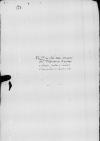List #2134
Ioannes DANTISCUS do Tiedemann GIESEHeilsberg (Lidzbark Warmiński), 1539-04-14
Regest polski:
Zgodnie z wcześniejszymi przewidywaniami Dantyszka jego oraz Giesego krajanie [rada Gdańska] popadli w kłopoty, toteż doradził im, by wstrzymali się z odpowiedzią na ostatni mandat królewski do sejmu [pruskiego].
Zawiadomił ich także, że z powodu zarazy w Malborku trzeba prosić króla [Zygmunta I] o przełożenie terminu i miejsca obrad. Pragnie szybko poznać zdanie Giesego w tej kwestii. Jest gotów wysłać posła na dwór, jeśli inni nie będą chcieli ponieść kosztów. Usprawiedliwił też [przed radą Gdańska] nową kancelarię [królewską], na którą się żalili.
Przesyła Giesemu (z prośbą o zwrot przy sposobności) otrzymany z Rzymu list, który napisał Dietrich [von Reden], m.in. w sprawie 400 dukatów ze spadku po [Maurycym Ferberze].
Z oburzeniem zawiadamia, że konkubina Aleksandra [Scultetiego] (Alexandrina) jest bliska kolejnego rozwiązania i nadal przebywa we Fromborku (apud communem ecclesiam nostram), nie dbając – jako córka przechrzty i nałożnica ateusza – o agrawację. Dlatego też Dantyszek wysłał reagrawację i zamierza doprowadzić rzecz do końca. Prosi, by Giese wsparł jego działania w tej sprawie listem do do kapituły [warmińskiej].
Rękopiśmienne podstawy źródłowe:
Pomocnicze podstawy źródłowe:
Publikacje:
| ||||||||
Tekst + aparat krytyczny + komentarzZwykły tekstTekst + komentarzTekst + aparat krytyczny
Reverendissimo in Christo Patri, domino, domino
Reverendissime in Christo Pater et Domine, frater et amice carissime et honoran(de) or honoran(dissime)⌈honoran(de)honoran(de) or honoran(dissime)⌉ .
Salutem et fraternum amorem.
Quemadmodum superioribus diebus Dominationi Vestrae Reverendissimae cf.
cf.
Accepi heri cf.
Quae diu feliciter et prosperrime valeat.
Ex
Reverendissimae Dominationis Vestrae frater integerrimus
[1] communis ecclesia nostra means here the cathedral church in


 BCz, 245, p. 170
BCz, 245, p. 170